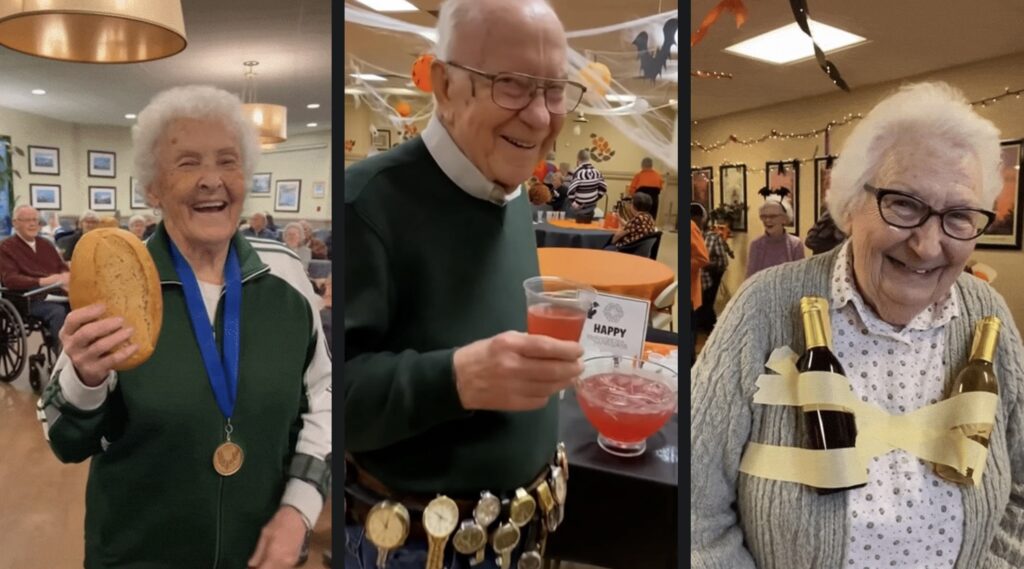An AI-generated retirement home has been going viral on TikTok, leaving viewers disappointed when they realise it’s actually all fake.
- The Rise of Convincing AI Content: With advancements like OpenAI’s Sora 2, AI-generated videos are blurring the lines between real and fake, but telltale signs like extra fingers or distorted logos often give them away—until accounts like Basin Creek Retirement push the boundaries.
- Viral Deception and Fan Backlash: The TikTok account, boasting over 63,000 followers, gained fame through seemingly authentic videos of retirees in clever Halloween costumes, only for fans to feel heartbroken upon discovering it’s all AI, sparking calls for better labeling.
- Entertainment with a Disclaimer: While the creators emphasize fun and creativity through merch and bios, the incident highlights broader concerns about trust in online content and the ethical implications of unlabeled AI media.
In the ever-evolving landscape of social media, where authenticity is often prized above all, a new wave of AI-generated content is challenging our perceptions of what’s real. Over recent months, AI videos have surged in prominence, captivating audiences with their lifelike quality. The launch of OpenAI’s Sora 2 has been a game-changer, pushing the boundaries of artificial intelligence to create visuals that mimic reality so convincingly that they leave viewers questioning everything. Yet, despite these advancements, there are still subtle clues that betray their synthetic origins—extra fingers on hands, lips that don’t sync perfectly with spoken words, or real-life logos that appear oddly distorted. Enter Basin Creek Retirement, a TikTok account that cleverly sidestepped many of these pitfalls, fooling thousands into believing they were witnessing genuine wholesome moments from a retirement home.

At first glance, Basin Creek Retirement seemed like the epitome of feel-good internet content. With over 63,000 followers, the account exploded in popularity during the spooky season, thanks to a series of videos featuring supposed retirees donning creative Halloween costumes. One standout clip showed a pensioner posing as “Raising Canes” by literally holding two canes aloft, a punny take that had viewers chuckling. Another depicted someone dressed as a “chipmunk”—a monk outfit adorned with packets of chips attached to their chest, blending wordplay with visual humor. These videos didn’t exhibit the usual AI glitches, making them appear remarkably authentic. As a result, some amassed over 2 million views, drawing in fans who praised the creativity and warmth, assuming they were peeking into the lives of real elderly folks embracing fun in their golden years.
But the charm quickly turned to disillusionment when the truth emerged: Basin Creek Retirement Home is entirely AI-generated. The account isn’t documenting a real facility; it’s a fictional world crafted with artificial intelligence and, as the bio puts it, “a lot of heart.” This revelation hit hard for many fans, who expressed their heartbreak in the comments. “Finding out this is AI pains my damn heart,” one viewer lamented, capturing the sense of betrayal felt by those who had invested emotionally in the content. Another commenter demanded accountability, stating, “It should be illegal to not clearly label AI videos,” highlighting growing concerns about transparency in digital media. A third admitted, “Ok, this so the first AI video that I thought was real. NOW I’m SCARED,” underscoring how convincingly the videos blurred the line between fiction and reality.
The creators of Basin Creek have made efforts to disclose the AI nature of their work, but it’s easy to see how it could slip past casual scrollers. The account’s bio explicitly states it’s “a fictional world made with AI & a lot of heart,” serving as a subtle nod to its artificial origins. However, not everyone pauses to read bios amid the fast-paced TikTok feed, and not all videos carry the platform’s optional AI-generated label. This oversight has fueled debates about responsibility in content creation, especially as AI tools become more sophisticated. For those who dive deeper, the account’s merch shop offers a fuller disclaimer: “This project exists purely for entertainment and creative expression—a small reminder that there’s still plenty left in the world to laugh about. Even if Basin Creek isn’t real, the laughter (and the merch) absolutely are.” Packed with hoodies and shirts inspired by the Halloween clips, the shop turns the viral deception into a tangible, fun experience, proving that while the retirement home is fake, the joy it sparks can be very real.
From a broader perspective, the Basin Creek saga reflects a pivotal shift in how we consume and create online content. As AI technologies like Sora 2 continue to advance, the line between genuine human experiences and machine-generated facsimiles grows thinner, raising ethical questions about deception, trust, and the future of social media. What started as harmless Halloween fun has sparked conversations about the need for mandatory labeling, similar to how sponsored posts are flagged, to protect viewers from emotional whiplash. It’s a reminder that in the age of AI, discernment is key—yet the allure of wholesome, viral content shows no signs of fading. Whether Basin Creek inspires more creative AI experiments or pushes for stricter regulations, one thing is clear: the internet’s most heartwarming moments might just be a clever algorithm away.

